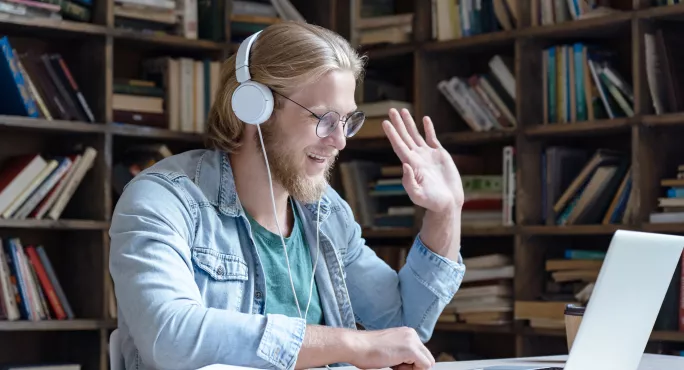
- Home
- Why we can’t go back to live online lessons
Why we can’t go back to live online lessons

It was Monday, 2pm - time for my webcam lesson with Year 9.
I was perched on a stool in my kitchen trying my best to look professional. My hair had been drawn up in a bun and my blazer was newly laundered, crisp and fresh. I’d even dabbed a bit of my work perfume on in an attempt to get fully in the zone.
It was my little ritual: I’d been teaching live lessons since the start of lockdown and nothing catastrophic had happened, so why change it?
Coronavirus lockdown: Online lessons
I set the pupils a retrieval practice grid as a starter, while I registered them. All their eyes were down, pens in hand as usual and all seemed well. I had no reason to suspect that this was different to any other day…until a notification popped up letting me know that a member of SLT had joined the room.
My heart skipped a beat; it was not just any member of SLT, it was the bloody headteacher. Great.
Read more
- Teaching online: How to approach blended learning
- School closures: How to prepare for remote teaching
- Lockdown preparations: Why you should adapt your curriculum for lockdown teaching
We were warned at the start of lockdown that it might happen. Members of SLT and officials from the academy trust had free rein over our lessons and could drop in as and when they pleased.
As it hadn’t happened to anyone I knew, I assumed the plan had been dropped to preserve staff wellbeing. After all, at a time of high anxieties when many staff were teaching well outside their comfort zone, why add to teachers’ worries and stresses?
Observation anxiety
The pupils had obviously cottoned on to the situation, too, because the moment I started asking for answers for the retrieval grid, they went completely silent. An observer might have suspected that I hadn’t actually taught them anything about the history of the bubonic plague until that point. The head’s presence had muted them better than any button on the computer could.
Without warning, and with what would have been an almost perfect sense of comic timing in any other situation, my two children began battering each other with the TV remote in the attached room - a timely reminder that home and the workplace are two separate spheres that should never mix.
The wailing and name-calling were so loud that I stopped what I was doing, completely, before getting up and simply shutting the door on them.
The impact on wellbeing
I finished the lesson, but the anxiety I was feeling undoubtedly affected the way I delivered the content. The head stayed for the whole thing (on mute the whole time) and left before speaking to me at the end. All I received in the way of feedback was a form forwarded to me by my head of department with a couple of X’s in boxes. Talk about impersonal.
I hate to admit this, but I cried myself to sleep that night.
While not a huge catastrophe in the grand scheme of things, this helps to highlight the bigger picture: we shouldn’t have been providing live lessons over webcam to students from our own homes (it’s just not practical), and we certainly shouldn’t have had members of the senior leadership team observing us - at least, not if they cared about our wellbeing.
Although I will admit there were some benefits of online observations, such as students feeling an SLT presence or having a back-up in case of poor behaviour, these benefits were outweighed by the anxiety they caused to the staff delivering the lessons, and in some sense to the students who were already nervous about responding to questions on a live video feed.
Too much stress
I don’t believe any of those observations can be used to judge the quality of teaching or of a department’s provision while they were remote teaching, either. When we were juggling our own lives - in some teachers’ cases having two or three children needing homeschooling themselves and no partner to support with this - and simultaneously trying to stick to a rigid daily timetable of schooling, it’s a wonder that many of us managed to keep our heads above water, let alone planning lessons of the same quality as we would in school.
The purpose of those observations is irrelevant: they cannot possibly have been an accurate reflection of our teaching ability, nor of our students’ progress.
Neither did they offer much in the way of professional development - there isn’t much that can be improved in a webcam lesson.
I can’t say for sure, but I’d venture a guess that this wasn’t SLT trying to be mean. Like anything in teaching, it all comes back to the fact that schools are being constantly scrutinised and played off against each other. If we didn’t have this dog-eat-dog scenario where schools must resort to extra interventions, Saturday school or working through the holidays in an effort to be the best, then perhaps senior leaders wouldn’t always be so desperate to prove they’re doing the right things.
The writer is a teacher in England and wishes to remain anonymous
Register with Tes and you can read five free articles every month, plus you'll have access to our range of award-winning newsletters.
Keep reading for just £4.90 per month
You've reached your limit of free articles this month. Subscribe for £4.90 per month for three months and get:
- Unlimited access to all Tes magazine content
- Exclusive subscriber-only stories
- Award-winning email newsletters
You've reached your limit of free articles this month. Subscribe for £4.90 per month for three months and get:
- Unlimited access to all Tes magazine content
- Exclusive subscriber-only stories
- Award-winning email newsletters



